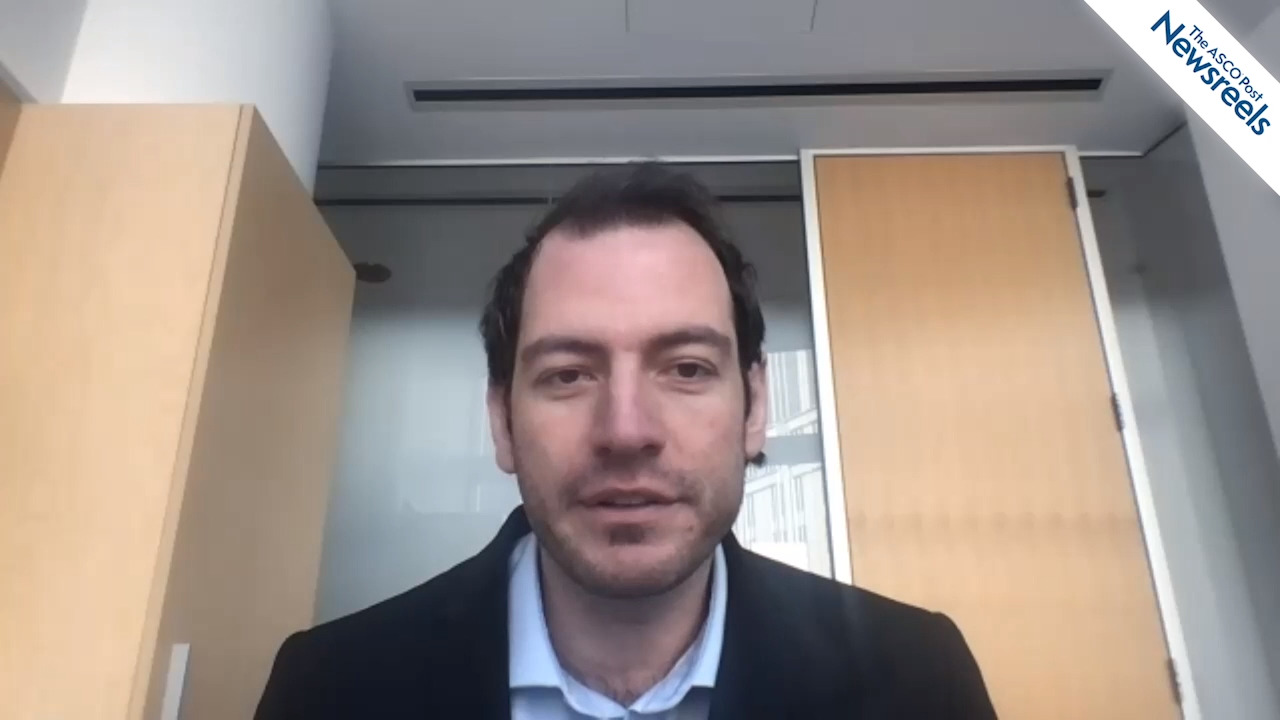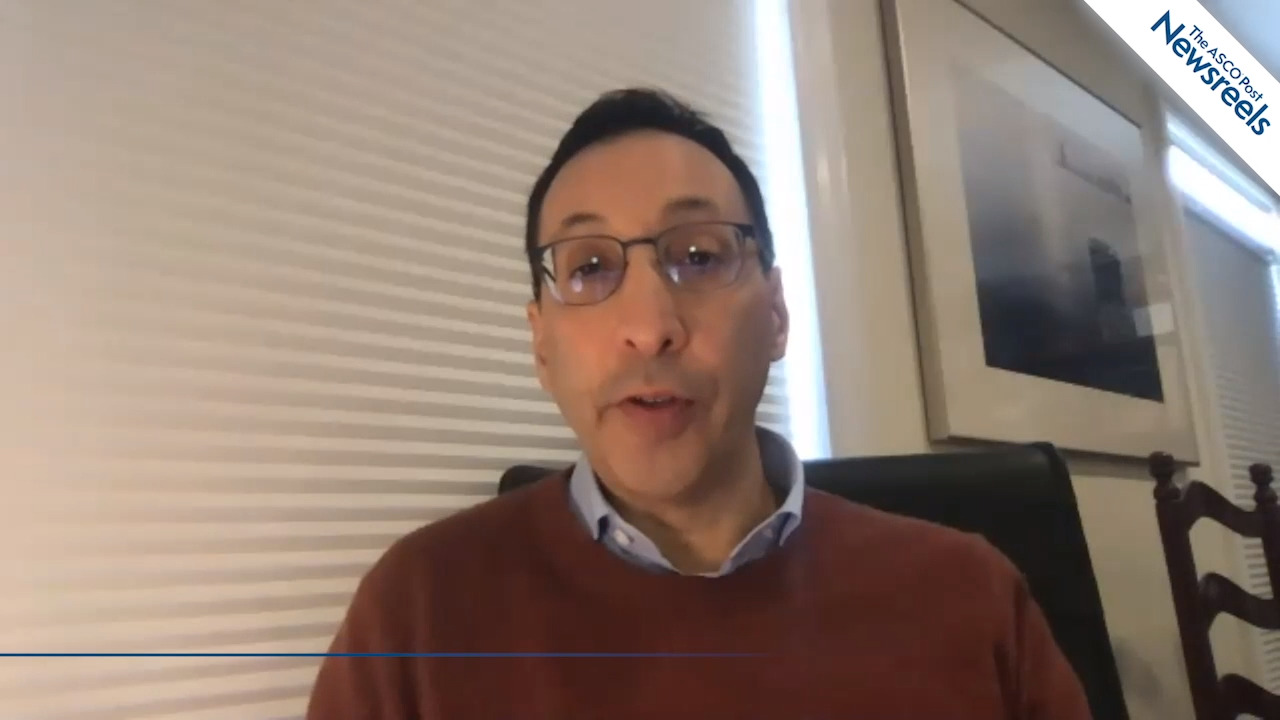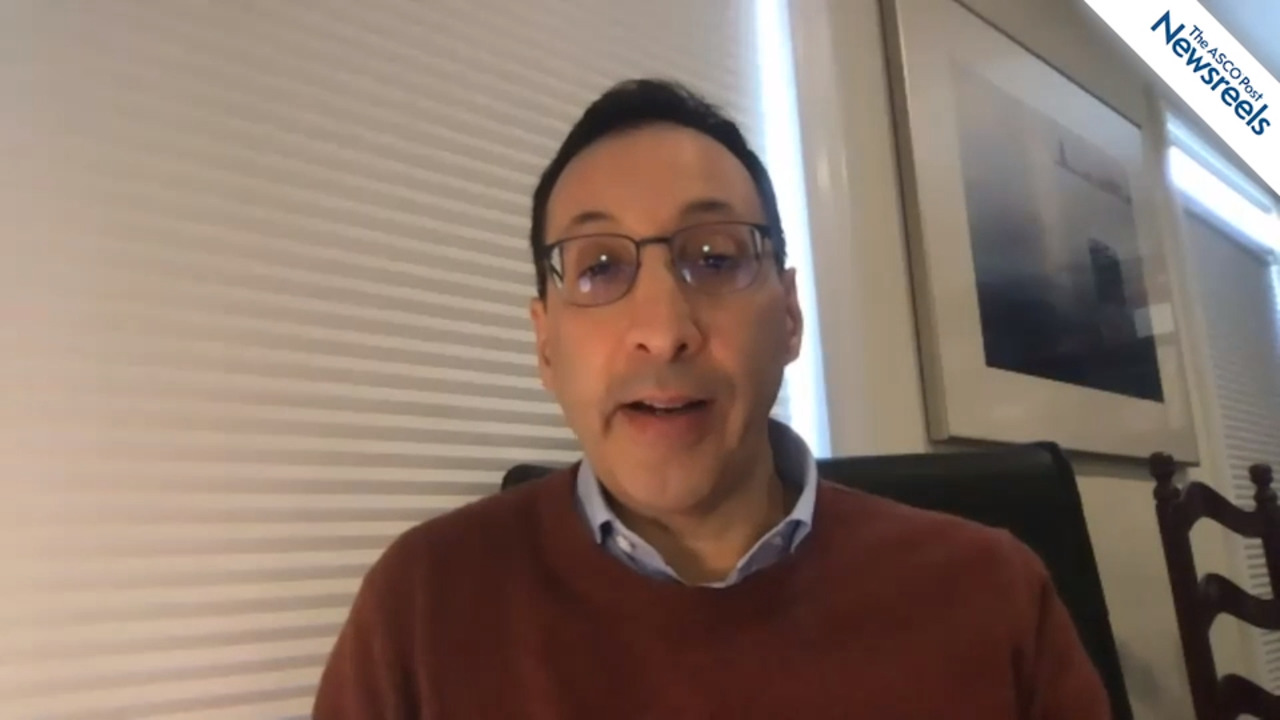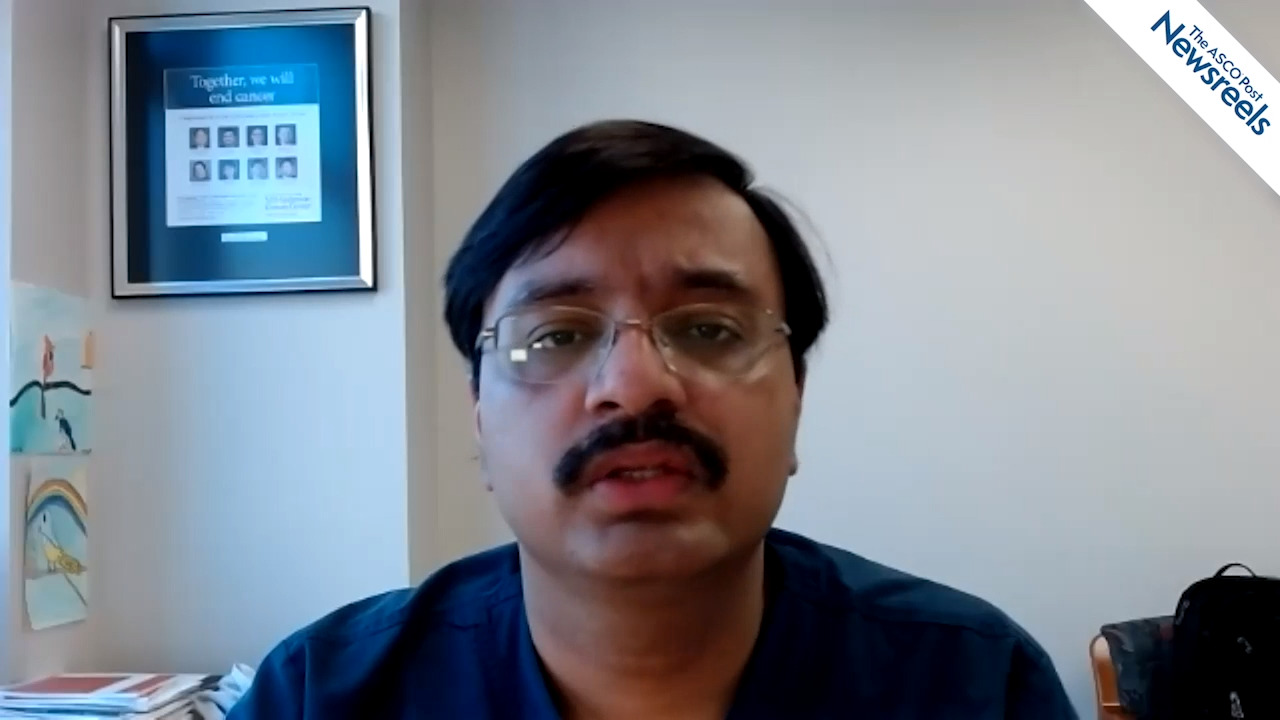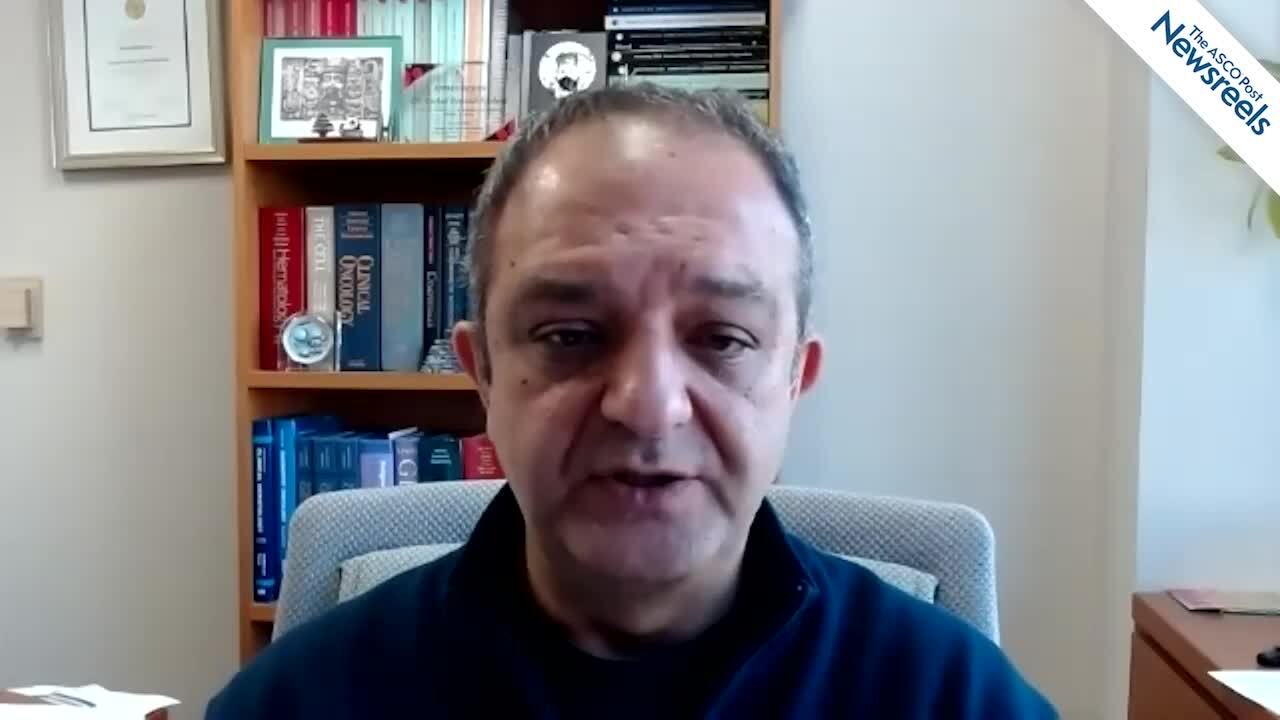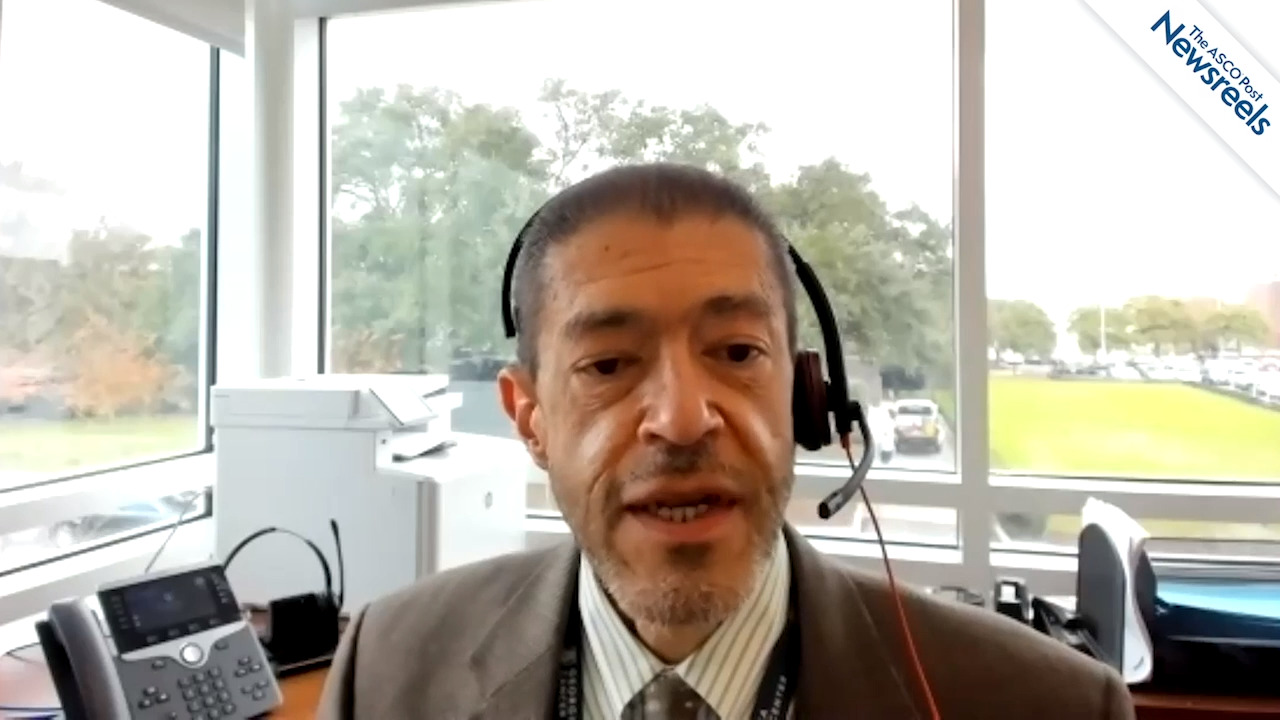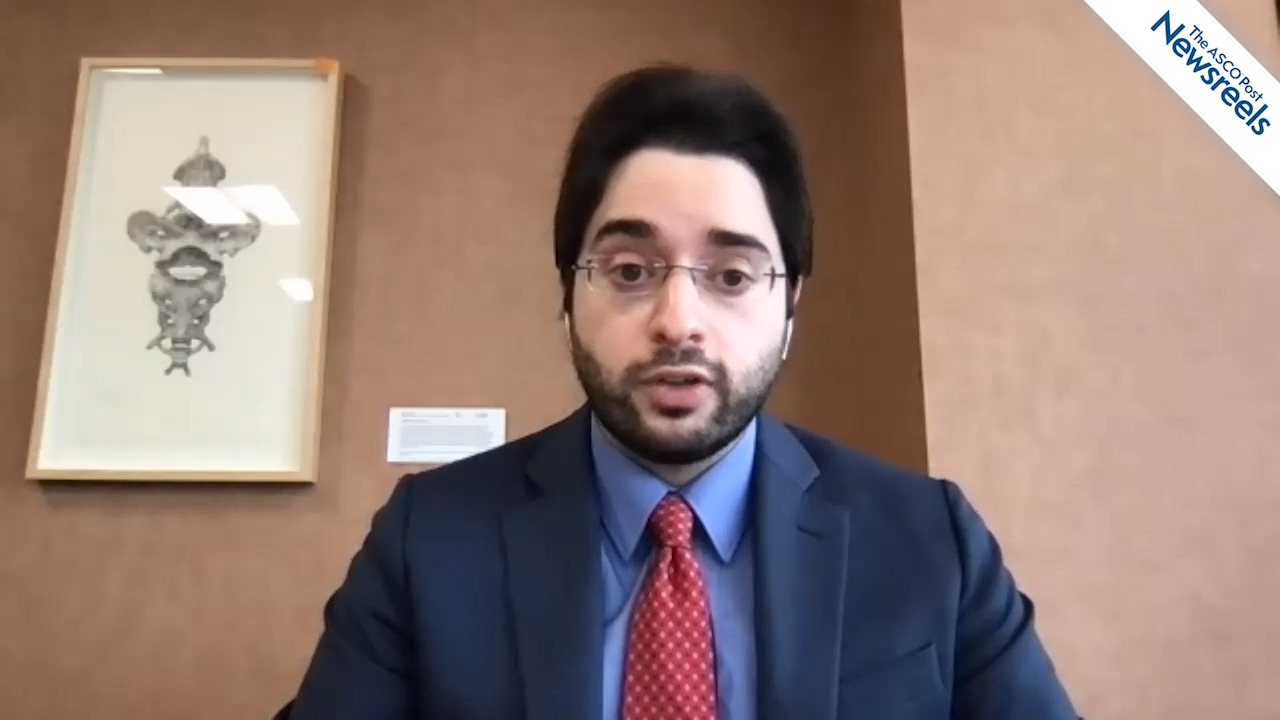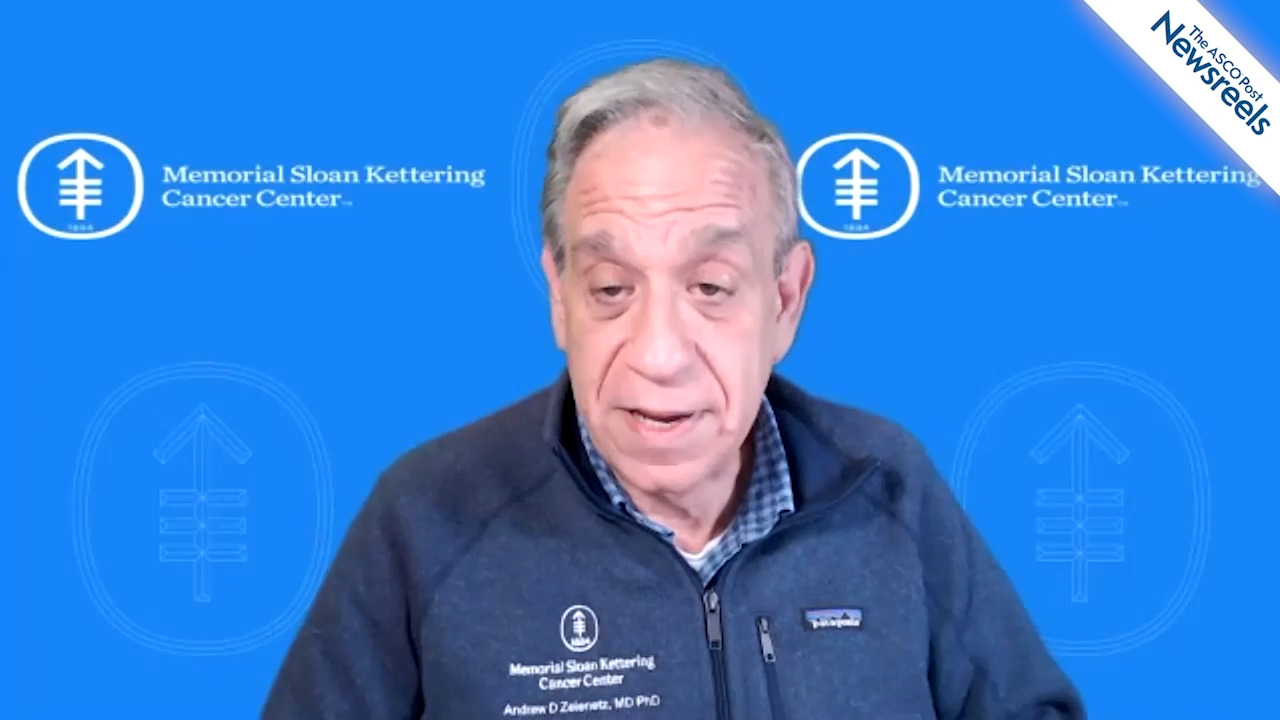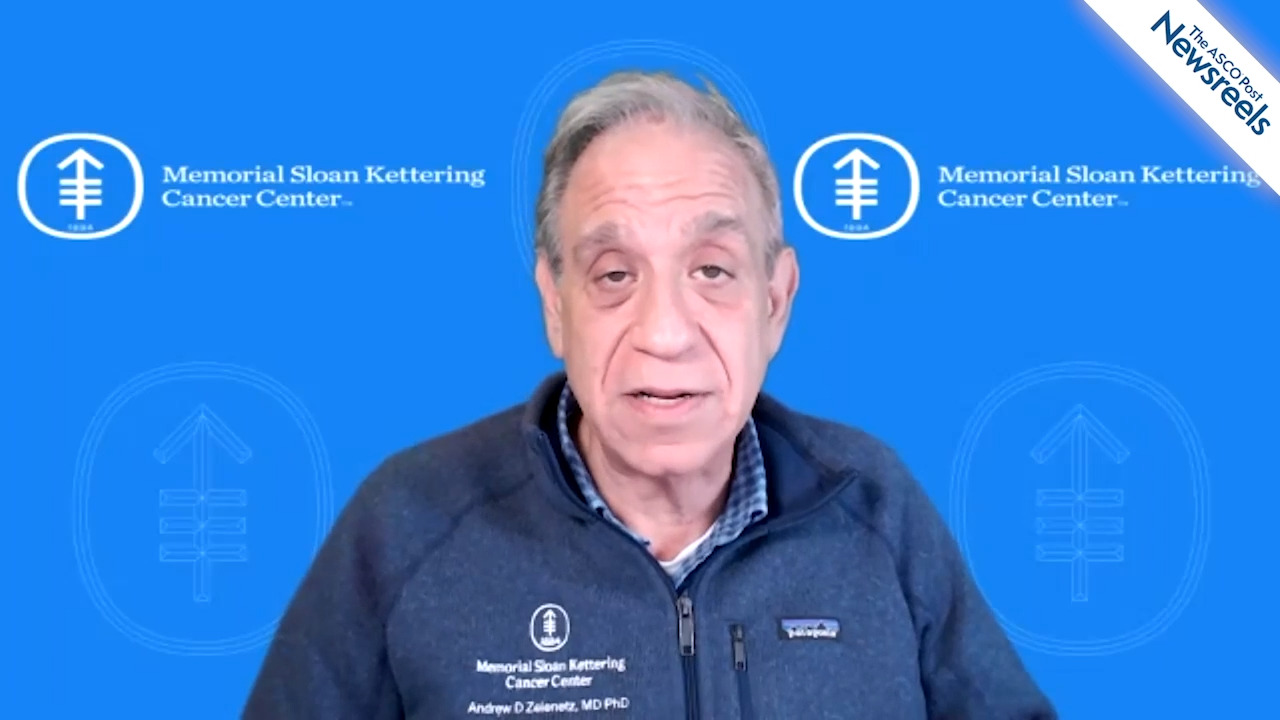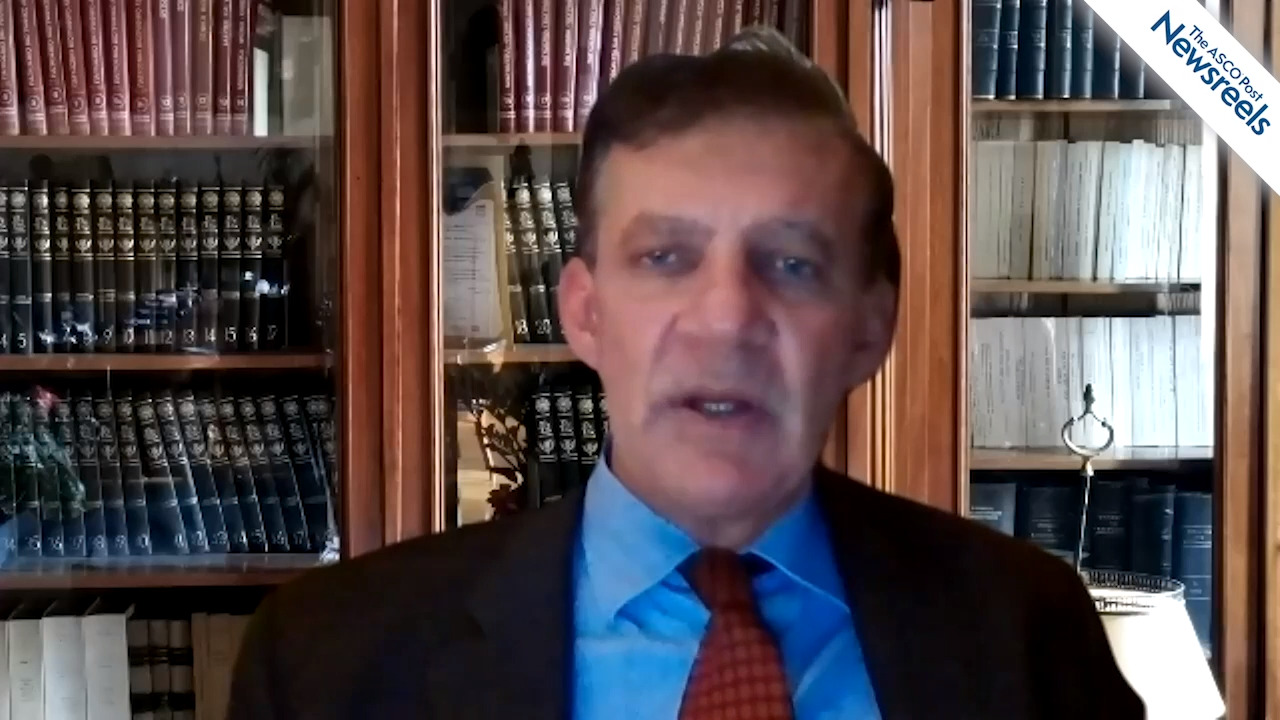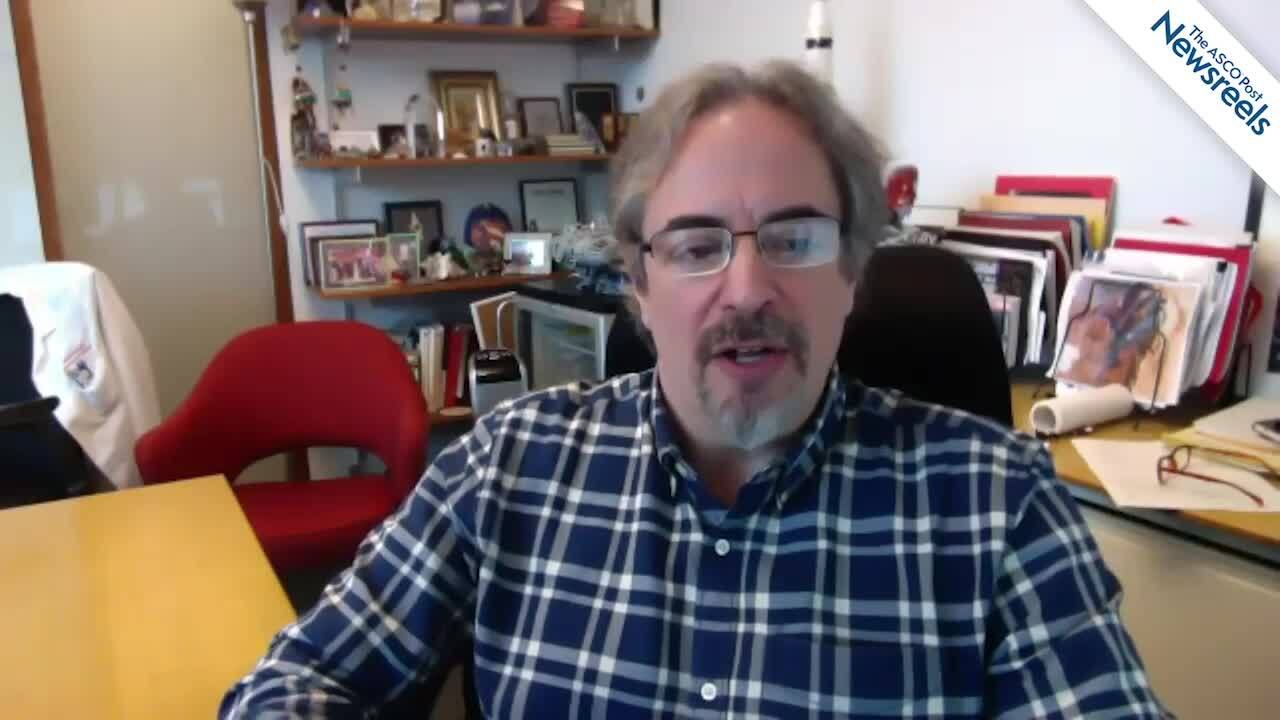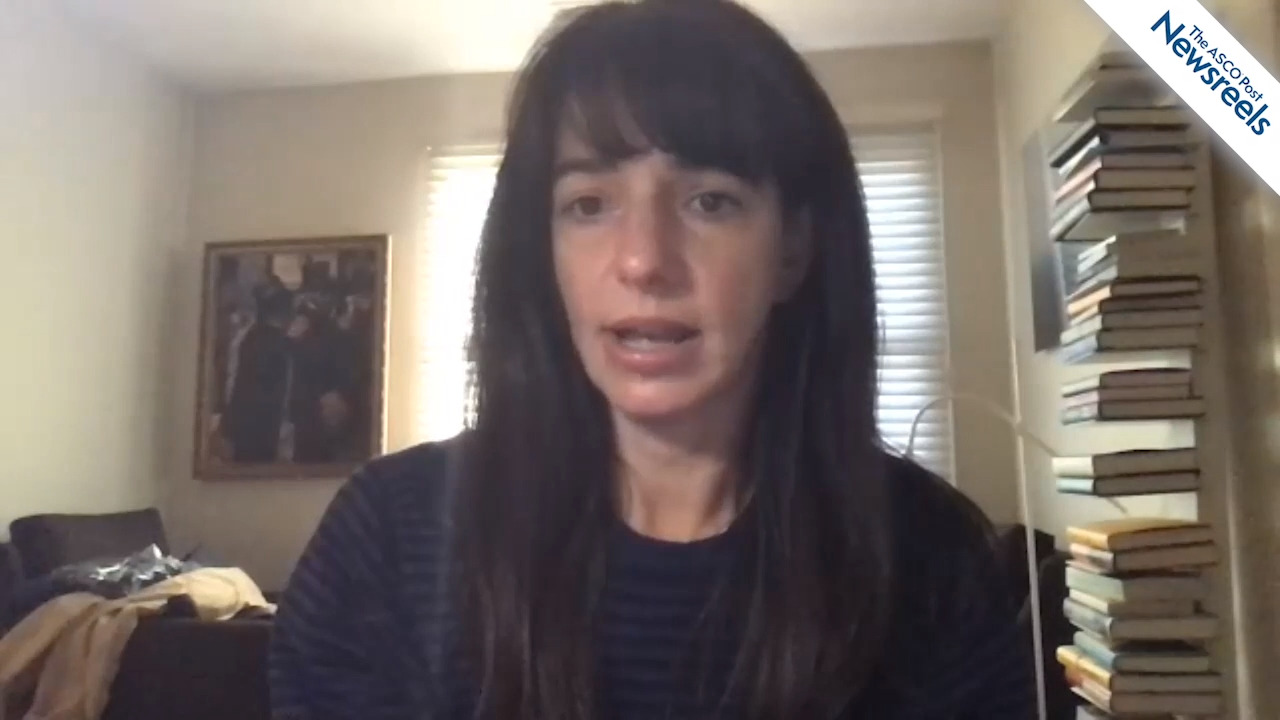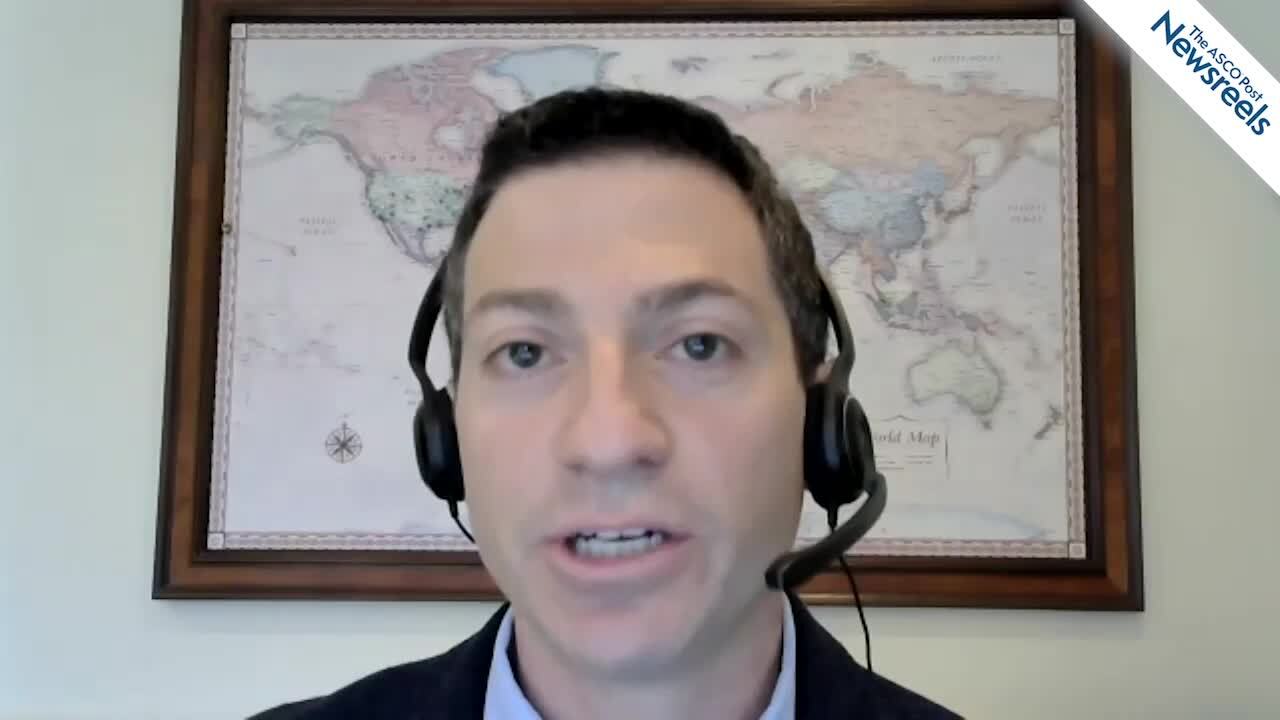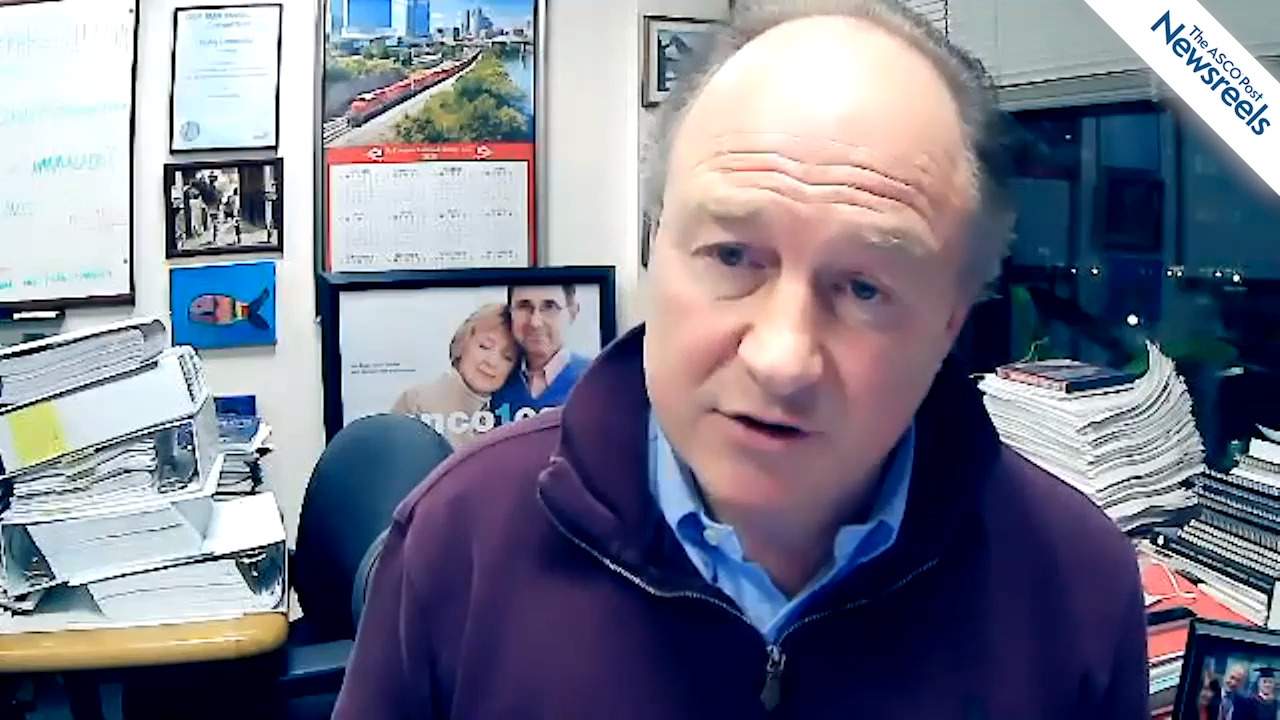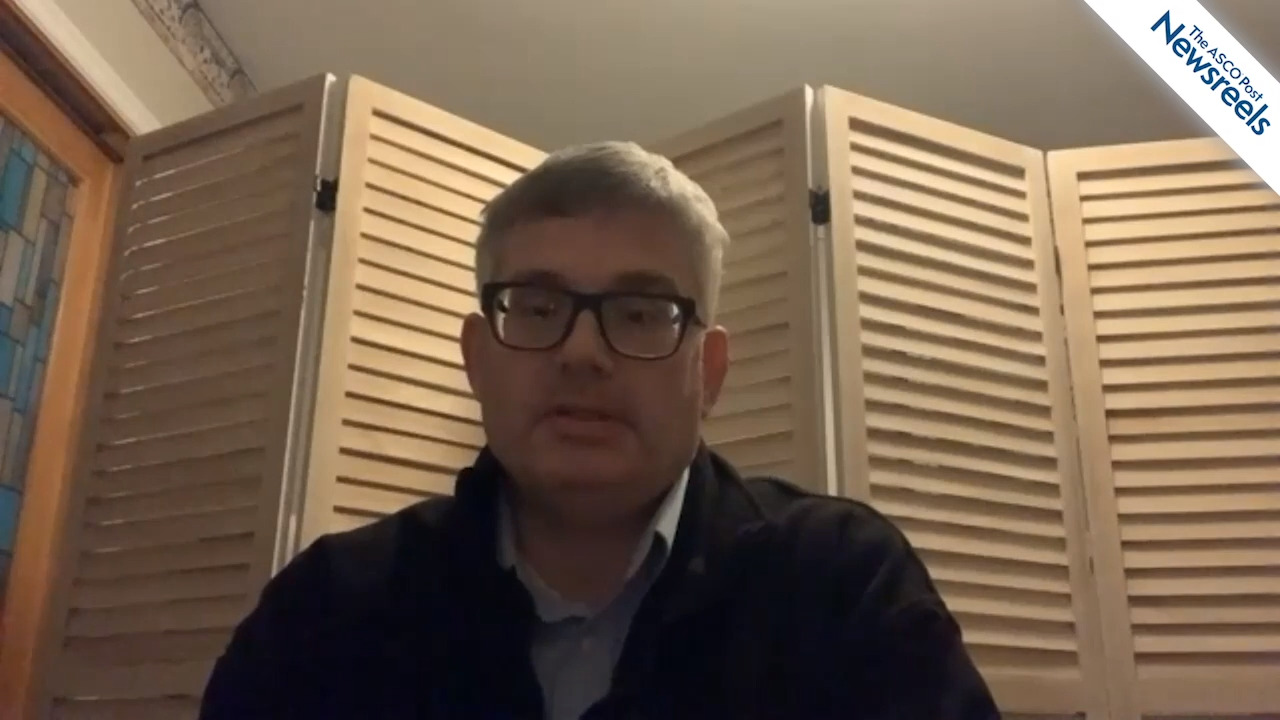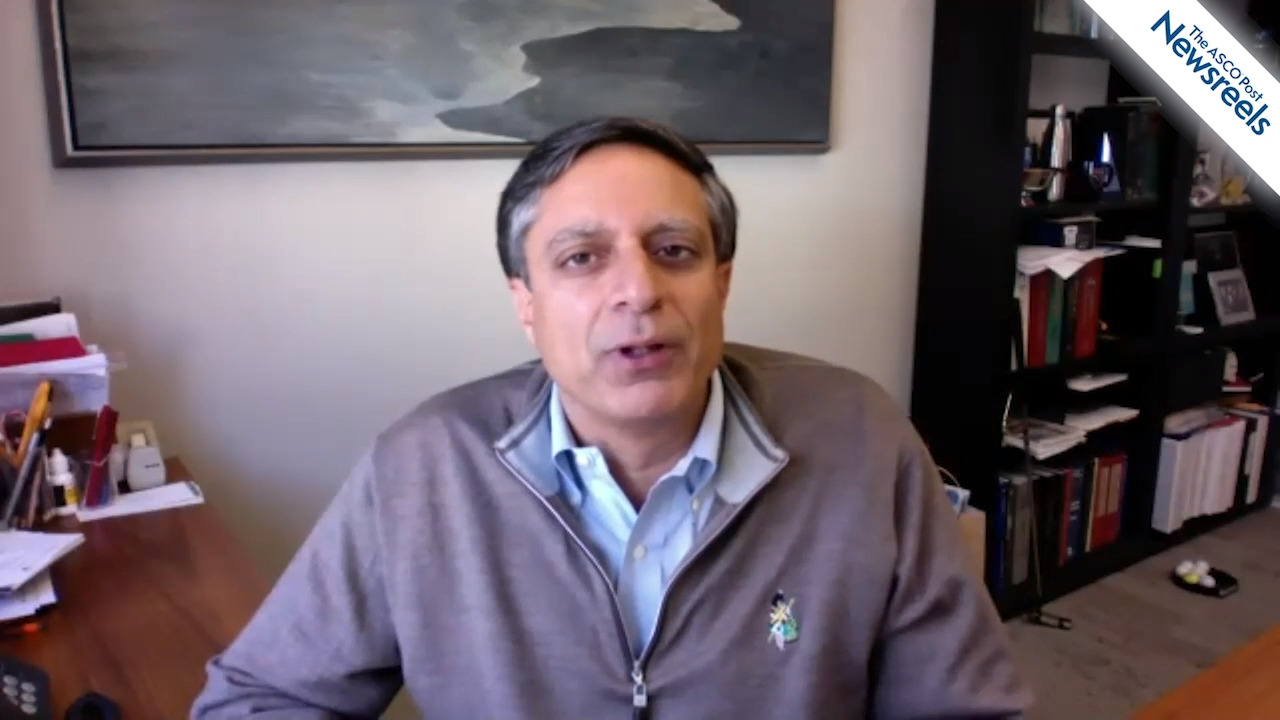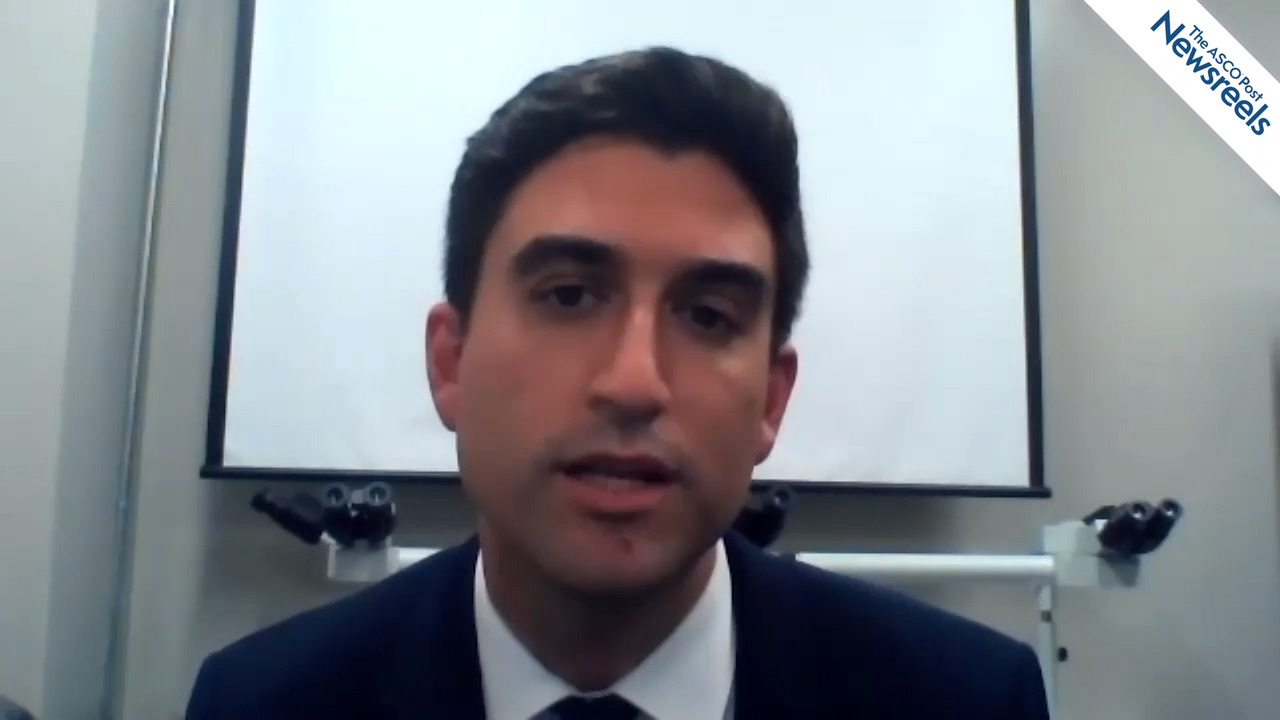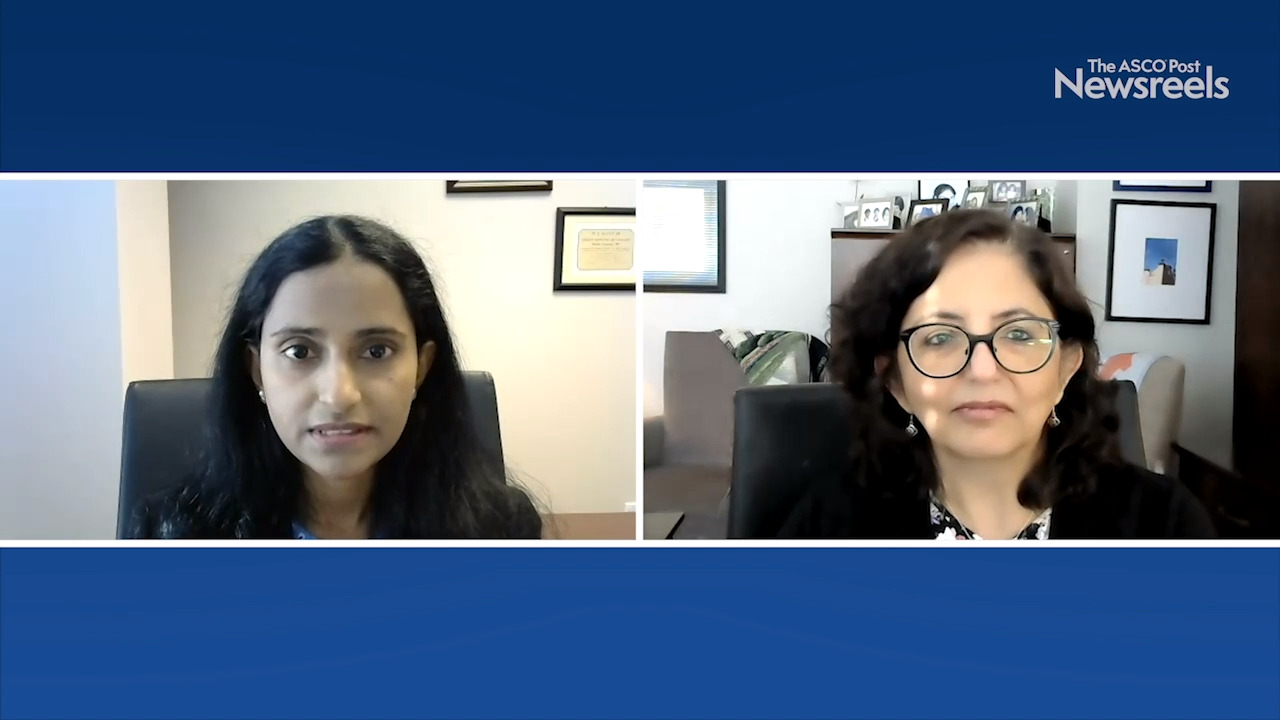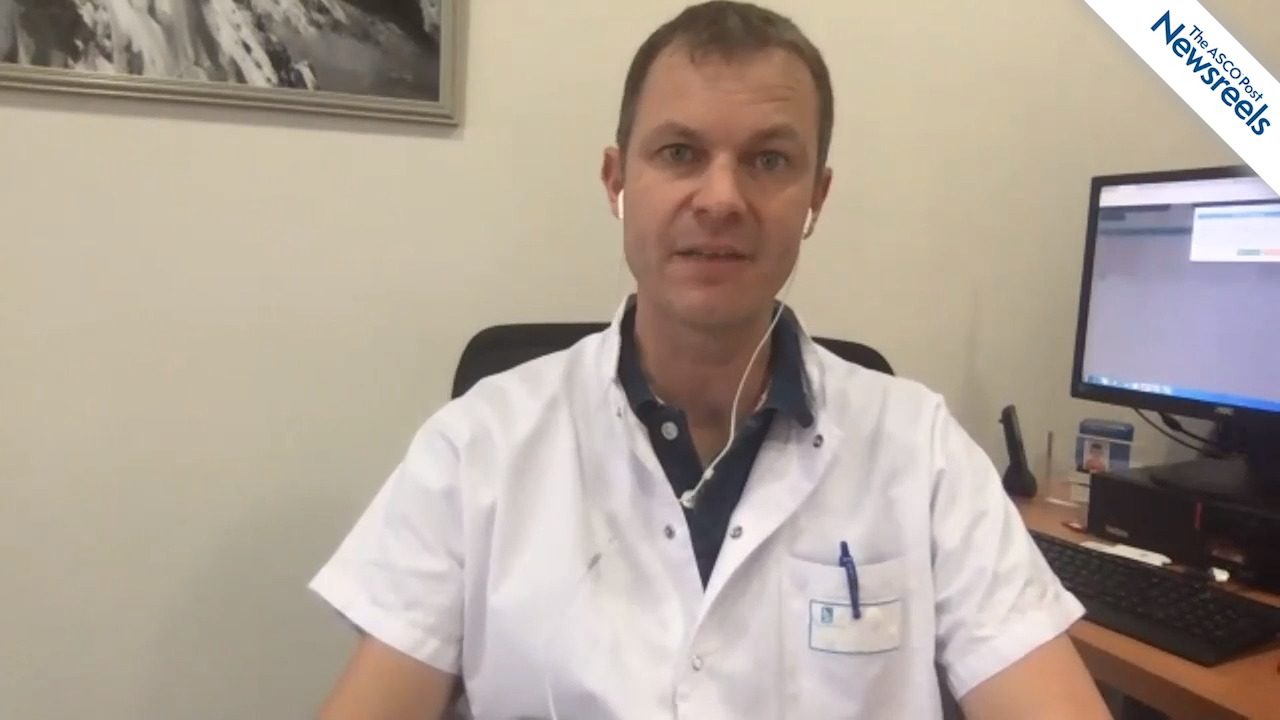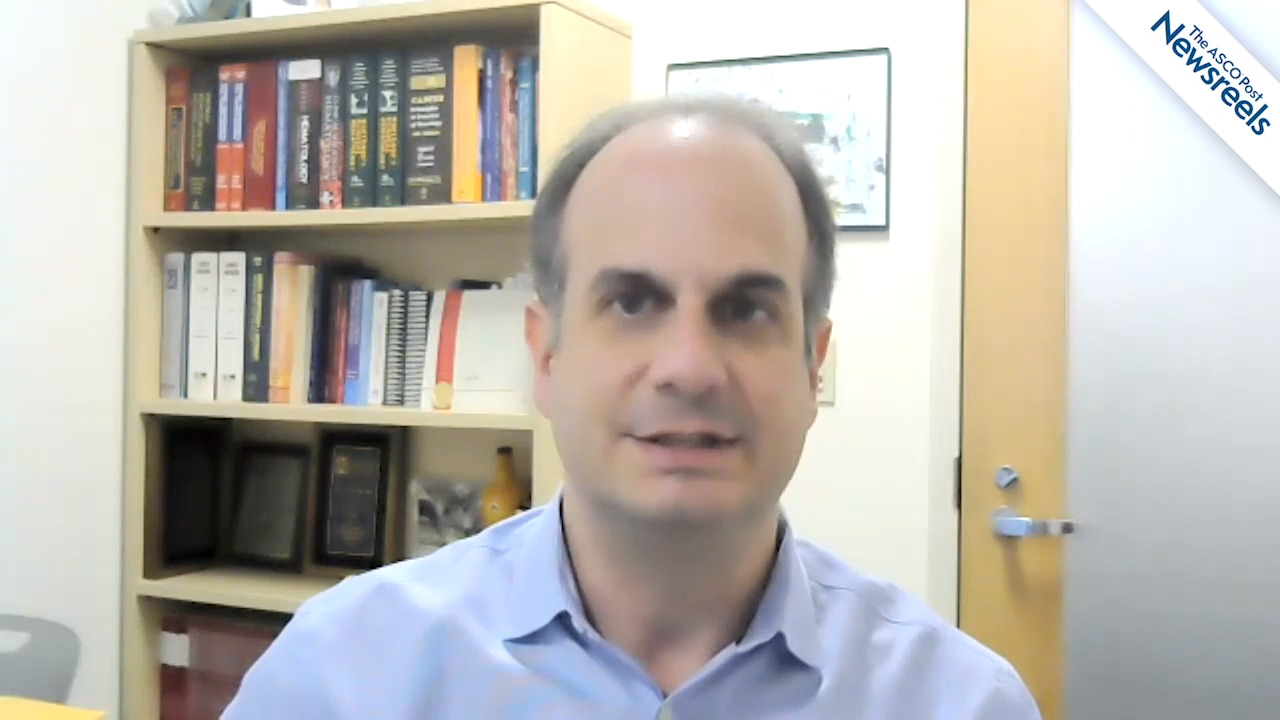2020 ASH Annual Meeting & Exposition
Christian Marinaccio, PhD Candidate: Genetic Driver May Play a Role in Progression of Myeloproliferative Neoplasms to AML
Christian Marinaccio, PhD Candidate, of Northwestern University, describes research he is conducting in the laboratory of John D. Crispino, PhD, which shows the loss of the tumor suppressor gene LKB1/...
Steven M. Horwitz, MD, on PTCL: Update on Efficacy of Duvelisib Dose Optimization
Steven M. Horwitz, MD, of Memorial Sloan Kettering Cancer Center, discusses phase II data from the Primo trial, which support continued evaluation of duvelisib as a treatment option for relapsed or re...
Tycel J. Phillips, MD, on Marginal Zone Lymphoma: Efficacy and Safety of Parsaclisib
Tycel J. Phillips, MD, of the University of Michigan Rogel Cancer Center, discusses phase II data from the CITADEL-204 study, showing that patients with relapsed or refractory marginal zone lymphoma w...
Steven M. Horwitz, MD, on T-Cell Lymphoma: Update on Allogeneic Hematopoietic Transplant
Steven M. Horwitz, MD, of Memorial Sloan Kettering Cancer Center, discusses data from the largest multicenter retrospective analysis of allogeneic hematopoietic transplantation, which supports its cur...
Anthony Fauci, MD, Encourages Patients With Cancer to Receive COVID-19 Vaccine
The American Society of Hematology (ASH) President Stephanie Lee, MD, MPH, sat down with Anthony Fauci, MD, Director of the National Institutes of Allergy and Infectious Diseases (NIAID) and medical...
Selected ASH Abstracts on Novel Treatments of Polycythemia Vera
To complement The ASCO Post’s continued comprehensive coverage of the 2020 American Society of Hematology (ASH) Annual Meeting & Exposition, here are three abstracts selected from the meeting pr...
ASH Registry: Treasure Trove of Data on COVID-19 and Hematologic Malignancies
The ASH Research Collaborative COVID-19 Registry for Hematology provides up-to-date information on outcomes and the course of illness for a group of patients with hematologic malignancies and COVID-19...
Fixed-Duration First-Line Ibrutinib Plus Venetoclax Yields Treatment-Free Remission in Some Patients With CLL
The randomized phase II CAPTIVATE trial showed that a fixed-duration treatment approach with 12 cycles of ibrutinib and venetoclax as first-line therapy for chronic lymphocytic leukemia (CLL) achieved...
First Sign of Myeloproliferative Neoplasms May Be in Utero
Genetic mutations linked to myeloproliferative neoplasms emerge in childhood or even in utero, decades before they cause cancer, according to a late-breaking abstract presented at the 2020 American So...
Ruxolitinib Improves Outcomes in Patients With Steroid-Refractory or Steroid-Dependent Graft-vs-Host Disease
Ruxolitinib was superior to best available therapy in achieving efficacy as determined by best overall response and duration of response, with acceptable safety in adolescents and adults with steroid-...
Identifying Multiple Myeloma Prognostic Subgroups With Distinct Genetic and Clinical Features
Multiple myeloma is the second most common blood cancer, after non-Hodgkin lymphoma, diagnosed in the United States. In 2020, it is estimated that about 32,270 people will be diagnosed with the cancer...
Transplant May Improve Survival in Older Patients With High-Risk Myelodysplastic Syndrome, Study Reports
Stem cell transplants are not frequently offered to older patients with high-risk myelodysplastic syndromes (MDS). According to a study from the Blood and Marrow Transplant Clinical Trials Network (B...
Disparities in Socioeconomic Status, Treatment Complications, and Obesity Impact Outcomes in Minority Patients With AML
A study by Ivy Abraham, MD, of the University of Illinois at Chicago, and colleagues, investigated the contribution of structural violence, specifically neighborhood socioeconomic status, on the racia...
Study Finds Survival Disparities and Mutational Differences for Black Patients Younger Than 60 With AML
It has been well documented that, collectively, Black individuals have the highest death rates and shortest survival of any racial/ethnic group in the United States for most cancers. Black men also ha...
Nitin Jain, MD, on B-Cell ALL: Expert Perspective on Key CAR T-Cell Treatment Advances
Nitin Jain, MD, of The University of Texas MD Anderson Cancer Center, reviews six important abstracts on CAR T-cell treatments for B-cell acute lymphoblastic leukemia (ALL): successful 24-hour manufac...
Farhad Ravandi, MD, on AML: Novel Combination Therapies for Newly Diagnosed Disease
Farhad Ravandi, MD, of The University of Texas MD Anderson Cancer Center, offers his expert perspective on key treatment studies in acute myeloid leukemia on the use of gilteritinib, consolidation che...
Jorge E. Cortes, MD, on CML: Expert Perspective on Key ASH Abstracts
Jorge E. Cortes, MD, of the Georgia Cancer Center at Augusta University, reviews four important studies of treatment advances in chronic myeloid leukemia (CML): nilotinib vs dasatinib in newly diagnos...
Hassan Awada, MD, on AML and Machine Learning: Improving Prognostication
Hassan Awada, MD, of the Taussig Cancer Institute, Cleveland Clinic Foundation, discusses the use of newer machine-learning techniques to help decipher a set of prognostic subgroups that could predict...
ASH 2020: ctDNA May Indicate Increased Risk of Relapse After Stem Cell Transplant in Patients With DLBCL
Many patients with diffuse large B-cell lymphoma (DLBCL) may be cured by autologous stem cell transplant, but as many as half eventually relapse. New research presented by Reid Merryman, MD, and colle...
ASH 2020: Phase II ZUMA-12 Study Investigates Axicabtagene Ciloleucel for High-Risk Large B-Cell Lymphoma
The phase II ZUMA-12 trial found that axicabtagene ciloleucel, an autologous anti-CD19 chimeric antigen receptor (CAR) T-cell therapy, is a safe and effective therapy for patients with high-risk large...
Andrew D. Zelenetz, MD, PhD, on Mantle Cell Lymphoma: Expert Perspective on Key Clinical Trials
Andrew D. Zelenetz, MD, PhD, of Memorial Sloan Kettering Cancer Center, offers his expert views on five treatment studies in mantle cell lymphoma focusing on the next-generation BTK inhibitor LOXO-305...
Andrew D. Zelenetz, MD, PhD, on Mantle Cell Lymphoma: Immunochemotherapy Plus Lenalidomide
Andrew D. Zelenetz, MD, PhD, of Memorial Sloan Kettering Cancer Center, discusses phase II results from a single-center study that explored a novel approach for high-risk patients with mantle cell lym...
Meletios A. Dimopoulos, MD, on Multiple Myeloma: Daratumumab, Pomalidomide, and Dexamethasone
Meletios A. Dimopoulos, MD, of the University of Athens, discusses data from the phase III APOLLO study, which evaluated the use of subcutaneous daratumumab plus pomalidomide and dexamethasone, vs pom...
Ari M. Melnick, MD, on Activated B-Cell–Like DLBCL: Gain-of-Function Mutations and Resistance to Ibrutinib
Ari M. Melnick, MD, of Weill Cornell Medicine, discusses the BCL10 mutation in patients with activated B-cell–like diffuse large B-cell lymphoma, and his study results which showed that the mutation s...
Caron A. Jacobson, MD, on Treating Large B-Cell Lymphoma With Axicabtagene Ciloleucel
Caron A. Jacobson, MD, of the Dana-Farber Cancer Institute, discusses results from the ZUMA-9 C2 study, an ongoing trial that is exploring axicabtagene ciloleucel in patients with relapsed or refracto...
Matthew S. Davids, MD, on CLL/SLL: New Data on Ibrutinib, Venetoclax, and Rituximab Therapies
Matthew S. Davids, MD, of Dana-Farber Cancer Institute, summarizes three key studies from a session he co-moderated on ibrutinib plus venetoclax for first-line treatment of patients with chronic lymph...
Paul G. Richardson, MD, on Multiple Myeloma: Roundup of Three Key Studies
Paul G. Richardson, MD, of Dana-Farber Cancer Institute, gives his expert perspective on three important studies in multiple myeloma: long-term results from the IFM 2009 trial on early vs late autolog...
David T. Teachey, MD, on Pediatric Leukemia and Lymphoma: New Findings on Cranial Radiation and Bortezomib
David T. Teachey, MD, of the University of Pennsylvania and Children’s Hospital of Philadelphia, discusses data showing that cranial radiation might be eliminated in most children with T-cell acute ly...
ASH 2020: Early Signs of Risk for Myeloproliferative Neoplasms May Appear in Childhood or in Utero
Genetic mutations linked to myeloproliferative neoplasms may emerge in childhood or even in utero, decades before they cause cancer, according to a late-breaking abstract presented today at the 2020 A...
ASH 2020: Chemotherapy Plus Blinatumomab for Philadelphia Chromosome–Negative B-Cell ALL
Results from a phase II study presented by Nicholas J. Short, MD, and colleagues at the 2020 American Society of Hematology (ASH) Annual Meeting & Exposition (Abstract 464) showed that first-line ...
Jyoti Nangalia, MBBChir, on MPN: A New Paradigm for the Development of Blood Cancer?
Jyoti Nangalia, MBBChir, of Wellcome Sanger Institute and the University of Cambridge, discusses how her team used large-scale whole-genome sequencing to precisely time the origins of a blood cancer...
Expert Point of View: David Snyder, MD
David Snyder, MD, Acting Chair, City of Hope Department of Hematology & Hematopoietic Cell Transplantation, Duarte, California, who was not involved in the ASCEMBL study, commented on the promise ...
ASH 2020: Study Finds Asciminib Safer, More Effective Than Bosutinib in Chronic Phase CML
Since the introduction of imatinib almost 18 years ago, similar next-generation tyrosine kinase inhibitors have been approved for chronic myeloid leukemia (CML), including dasatinib, nilotinib, bosuti...
Sagar Lonial, MD, on CAR T-Cell Therapies for Myeloma: Novel Approaches and Longer-Term Follow-up Data
Sagar Lonial, MD, of the Emory University School of Medicine, summarizes key papers presented in a session he co-moderated on how second-generation CAR T cells can be used to treat patients with multi...
ZUMA-5 Trial Finds Axicabtagene Ciloleucel Shows Activity in Patients With Indolent Non-Hodgkin Lymphoma
In the phase II ZUMA-5 trial, axicabtagene ciloleucel led to responses in 92% of patients with indolent non-Hodgkin lymphoma treated with the cellular immunotherapy. These findings were reported by Ca...
ASH 2020: Multiple Myeloma Patient Similarity Network Identifies Prognostic Subgroups With Distinct Genetic and Clinical Features
An analysis by Bhalla et al of multiomics data from newly diagnosed patients with multiple myeloma has identified 3 main patient groups and 12 prognostic subgroups (as well as potential vulnerabilitie...
ASH 2020: Role of Venetoclax in High-Risk Myeloid Malignancies
The BCL2 inhibitor venetoclax can be safely added to standard therapies for some high-risk myeloid blood cancers, and in early studies, the combination showed improved outcomes, according to two repor...
ASH 2020: Subcutaneous Teclistamab for Relapsed or Refractory Multiple Myeloma Studied in Phase I Trial
A subcutaneous injection of the BCMAxCD3 bispecific antibody teclistamab was found to be safe and elicited responses in a majority of patients with relapsed or refractory multiple myeloma, according t...
ASH 2020: Environmental Surface Testing for Presence of SARS-CoV-2 in Inpatient and Outpatient Hematology/Oncology Settings
A research team from Rutgers Cancer Institute of New Jersey evaluated the presence of SARS-CoV-2 on various environmental surfaces in outpatient and inpatient hematology/oncology settings. The study r...
Curtis Lachowiez, MD, on AML: Venetoclax in Combination With Standard Intensive Induction/Consolidation Therapy
Curtis Lachowiez, MD, of The University of Texas MD Anderson Cancer Center, discusses an interim analysis of a phase Ib/II study showing that venetoclax plus chemotherapy represents an effective regim...
ASH 2020: Novel Antibody-Drug Conjugate Shows Activity in Rare, Aggressive Form of Leukemia
A phase I/II study found that IMGN632, a novel CD123-targeting antibody-drug conjugate, was tolerable and resulted in a 29% overall response rate in patients with relapsed or refractory blastic plasma...
ASH 2020: Clonal Hematopoiesis in Donors Aged 40 and Older May Be Linked to Improved Survival in Stem Cell Transplant Recipients
A study presented by Christopher Gibson, MD, and colleagues at the 2020 American Society of Hematology (ASH) Annual Meeting & Exposition (Abstract 80) has revealed for the first time that clonal h...
ASH 2020: Early Research Shows CD58 May Be a Biomarker for Response to Axicabtagene Ciloleucel in Patients With Large B-Cell Lymphoma
Although the immunotherapy axicabtagene ciloleucel has significantly improved treatment outcomes for some patients with large B-cell lymphoma, not all patients benefit. In a new study presented by Ro...
Reduced-Intensity Allogeneic Hematopoietic Stem Cell Transplant May Improve Survival in Older Patients With High-Risk MDS
Stem cell transplants are not frequently offered to older patients with high-risk myelodysplastic syndromes (MDS). According to a study from the Blood and Marrow Transplant Clinical Trials Network (BM...
Radhika Gangaraju, MD, and Smita Bhatia, MD, MPH, on Coronary Heart Disease Risk in Blood or Marrow Transplant Survivors
Smita Bhatia, MD, MPH, and Radhika Gangaraju, MD, both of the Institute for Cancer Outcomes and Survivorship, University of Alabama at Birmingham, discuss findings that showed survivors of bone marrow...
Emmanuel Bachy, MD, PhD, on Peripheral T-Cell Lymphoma: Romidepsin Plus CHOP
Emmanuel Bachy, MD, PhD, of the Hospices Civils de Lyon, discusses the final analysis of a phase III study of adding romidepsin to chemotherapy in patients with previously untreated peripheral T-cell ...
Corey Cutler, MD, MPH, on MDS: Evaluating Treatments in Older Patients With Advanced Disease
Corey Cutler, MD, MPH, of Dana-Farber Cancer Institute, discusses results from a multicenter trial that compared reduced-intensity allogeneic hematopoietic cell transplantation to hypomethylating ther...
ASH 2020: Vital Information on Patients With COVID-19 and Hematologic Malignancies Provided by ASH Research Collaborative Data Hub
The ASH Research Collaborative COVID-19 Registry for Hematology provides up-to-date information on outcomes and the course of illness for a group of patients with hematologic malignancies and COVID-19...
ASH 2020: SARS-Cov-2 Multivirus-Specific T Cells for the Treatment of Hospitalized Patients With COVID-19
Researchers have successfully built banks of SARS-CoV-2–specific T cells obtained from people who recovered from the virus that are now poised to be used as an experimental treatment in patients hospi...
ASH 2020: APOLLO Findings Support Use of Subcutaneous Daratumumab Plus Pomalidomide/Dexamethasone in Relapsed or Refractory Multiple Myeloma
For patients with relapsed or refractory multiple myeloma whose disease progressed after at least one prior regimen, the subcutaneous form of daratumumab, given with pomalidomide and dexamethasone, si...
